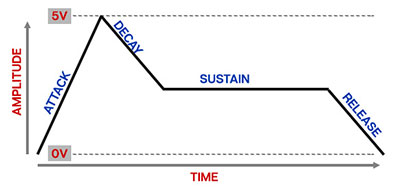VCA is short for “voltage-controlled amplifier,” and for all intents and purposes, you can think of it as an automated volume knob.
(LFO) Mod- Adds amplitude modulation from the low-frequency oscillator. It's useful for tremolo effects at low LFO rates, and can create pretty wild amplitude modulation effects at fast LFO rates.
VCA Envelope- This shapes the amplitude curve of notes.
How An ADSR Envelope Generator Works

When Mercury-4 sees a gate voltage from a note, the envelope generator outputs a dynamically changing voltage, according to the settings of its four stages. The attack stage defines how long it takes for the output voltage to rise from 0 to 5 volts. Once the attack stage reaches 5V, it moves to the decay phase, which defines how long it takes to fall from 5V to the setting of the Sustain phase. Unlike the attack, decay, and release phases, which define times, sustain simply sets the held voltage level following the attack and decay phases - this equates to the envelope output level while holding down a key. Finally, the release slider defines the the length of time it takes for the voltage to fall back to 0V when the gate input voltage is removed, i.e. when the key is released.
Attack- Defines the length of time for voltage to rise from 0V to 5V when a key is played.
Decay- Defines the length of time for voltage to fall from the attack stage 5V peak to sustain stage setting.
Sustain- Sets the voltage level following attack and decay phases while a note is held.
Release- Defines the length of time for voltage to fall from sustain level to 0V when a key is released.
Vel- Short for "velocity," this allows keyboard velocity to control the volume of sounds. Increasing the amount adds sensitivity with lightly played notes getting quieter.
Level and clip LED- In the original Jupiter-4, this acted as a programmable volume control, in order to balance volume levels between presets. The master volume (the big knob all the way on the left) was not programmable - it didn't save with presets. Both the VCA Level slider and the master Volume knob are stored in Mercury-4 patches.
Roland analog synths are known to be conservative with their gain-staging, that is, they generally don't tend to distort very easily, but the Jupiter-4 was the exception. It's real easy to distort a Jupiter-4 with the VCA Level control, and Mercury-4 very accurately replicates the raunch, firestarter. We've included the LED clip indicator, which is kind of silly - it's real obvious when it's breaking up! You'll quickly find that optimal gain-staging is a balancing act between the VCA Level slider and the master Volume knob. It should go without saying that you're free to distort the heck out of this thing if you like the way it sounds!